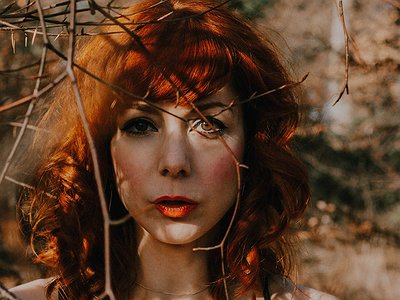Name: The Anchoress / Catherine Anne Davies
Nationality: Welsh
Occupation: Multi-instrumentalist, singer, songwriter
Current release: The Art of Losing by The Anchoress is out now on Kscope.
The Anchoress has an excellent website for further information. If you enjoyed her thoughts, you may also enjoy our 15 Questions Anchoress interview.
The Anchoress / Catherine Anne Davies: "Music has always had the power to move me emotionally in a way that words alone cannot. I think here lies its power to allow us to process and feel the wounds of grief and loss in a primal and physical way. A certain chord movement or swell of strings can be arranged thus so it perfectly captures the emotion of a moment or the longing for someone departed. This was something I very much tried to do on the pieces on The Art of Losing that have no vocal.
It’s probably in the making of this album that I have most shifted my perspective on the nature of life and death. It was an album that I made in the face of experiencing a series of huge personal losses and traumas - the death of my father, multiple baby loss, and then my own diagnosis with cervical cancer. It shifted my perspective from someone who perhaps one romanticised the notion of suffering as key to creativity, to someone who would furiously refute that equation.
With The Art of Losing. I wanted to explore what we “gain” when we ‘lose”, perhaps in some vain attempt to find meaning or control in a world that was spinning into chaos and endless loss. But I wanted to do it in a way that refused the elegiac or funereal traditions. I wasn’t interested so much as to make a sombre sounding album of slow, sad, piano ballads. I wanted to relay something of the rage and anger I felt at the unfairness of all the loss thrown at me by circumstance. I hope that people will find it to be an uplifting and hopeful album rather than one steeped in sadness.
~
I think for many of us, music is felt most keenly in our adolescence. For me, it was a means to be able to express emotions that I had no words for and to connect with others who had experienced similar things to me as a teenager. But this intensity and importance has also made me shy away from it when confronted with traumatising experiences. For instance, I did not want to associate my Dad’s premature death with so much of the music that I loved that I stopped listening to my favourite albums for over a year. I still can’t listen to Cat Power as she was playing in the car as we raced to the hospital.
~
For me, as a producer and a musician, music has given me the tools to process and understand death and the difficult experiences I have faced. In much the same way as a painter would paint, or a novelist would write, I have found the tools of my trade to be the means by which I can come closer to an understanding of my experiences and emotions. It is as much a working through as therapy might be, or talking to a friend.
‘Let It Hurt’ is the second song on my new album and was written in the wake of the death of my father and losing my first baby. This was one of those rare songs that came to me almost fully-formed. I wrote it on the upright Challen piano in my hallway. I was on the way out to catch a train to London. Needless to say, I missed that train and caught this song instead. It addresses the central themes of the album; about allowing yourself to fully feel the experience of loss and grief. Too often we distract ourselves with work or defer the pain through other means. “Stop arguing with yourself” is me telling myself to stop, and feel the pain. The choruses are a homage to my ongoing obsession with John Grant’s ability to shoehorn polysyllables into alternative pop ballads. I’m quite proud of myself for managing to rhyme “monopoly” with “existential melancholy” and “misogyny”.
~
What happens when life ends? I’m not certain. I think it’s beyond what science can tell us currently but I know for certain that we live on in the hearts and minds of the people that we leave behind. Perhaps this is the basis upon which many religions have constructed the notion of an afterlife.
I don’t care what they play at my funeral but as a piece of music that gives me comfort, I adore Max Richter’s ‘On The Nature of Daylight’. I play it often and think of those I have lost and when we will meet again."




